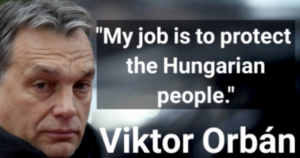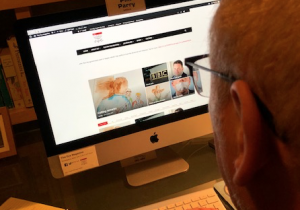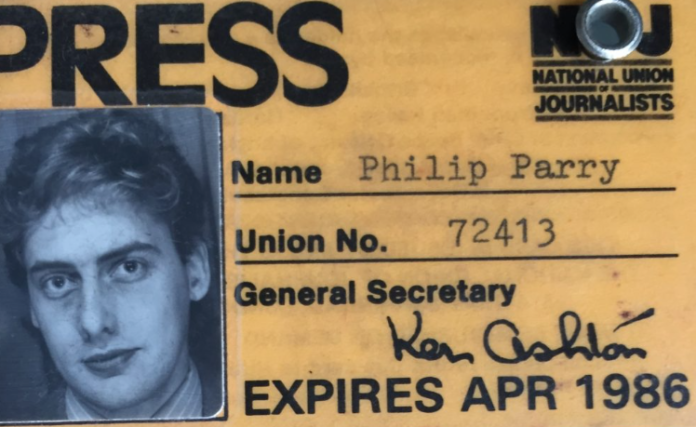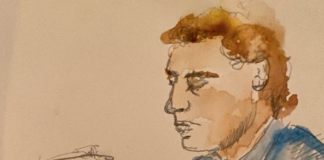- Dark speak easy part one - 18th February 2026
- X marks the spot again - 17th February 2026
- Wordy again part three - 16th February 2026

During 23 years with the BBC, and a 40 year journalistic career (when he was trained to use clear and simple language, avoiding jargon), our Editor, Welshman Phil Parry has covered innumerable elections (indeed his first television interview was with a Welsh MP during the 1987 campaign), and now critics fear the rise of the Right in the European Elections could herald restrictions on a free media, which is complete anathema to Phil.

I am shocked by what has happened.
Far-right and nationalist parties have made huge gains in the European Elections (and the more reasonable centre-right also performed well).
In Germany, the far-right AfD (Alternative for Germany) came second with 15.9 percent while the social democratic SPD had to make do with coming third third after they gained a mighty 13.9 per cent. Coming top was the conservative CDU party with 30 per cent of the vote.

The AfD have declared: “Just negotiate with Putin, and buy Russian gas again”.
The results in Europe have proved that the Italian Prime Minister Giorgia Meloni has cemented her grip on power.
She used the elections to the European Parliament to boost her own popularity by putting her name at the top of her party’s ballot, and it proved a successful gamble, as her party got 29 per cent, increasing the vote she achieved in the 2022 General Election (GE).

For the Netherlands these results proved a wake up call to mainstream politicians, with huge gains for its anti-immigration party.
The Freedom Party (PVV) party leader Geert Wilders, who until recently promised a referendum on Nexit (i.e. Netherlands’ exit from the EU) posted five red love heart emojis on X, proclaiming: “Still the biggest winner with five more seats“.
 In Hungary, Viktor Orban’s Fidesz party won both the European and Municipal elections.
In Hungary, Viktor Orban’s Fidesz party won both the European and Municipal elections.
Peter Magyar’s centre-right Tisza party replaced the old centrist opposition – Fidesz got 44 per cent and Tisza 30 per cent.


In Austria, the situation is equally bad.
The Freedom Party (FPÖ) leader, Herbert Kickl, told a crowd of cheering supporters that his party’s victory in the European Elections marked “a new era in politics”.
After most of the votes were counted, it had been revealed the FPÖ won 25.7 per cent, ahead of the conservative People’s Party at 24.7 per cent, with the Social Democrats on 23.3 per cent, the Greens on 10.9 per cent, and the liberal Neos on just 10.1 per cent.

But it is, perhaps, France which is of most concern, because the centrist president Emmanuel Macron has been forced to hold a snap election as the Right has done so well in the European Elections.
The National Rally (RN) won about 32 per cent of the vote on Sunday, more than double the 15 per cent or so scored by the president’s allies. The Socialists were on only 14 per cent.

All these parties hold questionable attitudes to the sort of investigative journalism I undertake, but let’s take as an example the media environment in a country where the Right is actually in charge – Hungary.
The Fidesz party has sought to tighten its control over the media there, drawing fierce criticism from media freedom organisations.
In 2022, the US-based Freedom House rated Hungary as only “partly free”, and it pointed out that legislation has allowed for politicised media regulation, while the public broadcaster is pro-Fidesz.

The media “are increasingly dominated by pro-government outlets, which are frequently used to smear political opponents”, it added.
Fidesz-friendly business figures have supplanted foreign companies as investors in key media, says Reporters Without Borders, and only online outlets carry the sort of investigative reporting I pursue, of alleged corruption involving officials.
In late 2018, nearly all pro-Government private media merged to form a conglomerate called the Central European Press and Media Foundation – ten companies handed themselves over to the foundation, amounting to hundreds of publications, websites and broadcast outlets.

I have always steered clear of organisations like this, because joining them would compromise any investigation, so it is obvious that my kind of journalism would not be tolerated in Hungary.
Whenever people ask what I do, I tell them: “I’M A PROFESSIONAL TROUBLE-MAKER!”.
Some of the political stories Phil has covered over the years, as he was gripped by the rare neurological condition Hereditary Spastic Paraplegia (HSP), have been released in a major book ‘A GOOD STORY’. Order it now!

Regrettably publication of another book, however, was refused, because it was to have included names.









